

Grammar


Tenses


Present

Present Simple

Present Continuous

Present Perfect

Present Perfect Continuous


Past

Past Simple

Past Continuous

Past Perfect

Past Perfect Continuous


Future

Future Simple

Future Continuous

Future Perfect

Future Perfect Continuous


Parts Of Speech


Nouns

Countable and uncountable nouns

Verbal nouns

Singular and Plural nouns

Proper nouns

Nouns gender

Nouns definition

Concrete nouns

Abstract nouns

Common nouns

Collective nouns

Definition Of Nouns

Animate and Inanimate nouns

Nouns


Verbs

Stative and dynamic verbs

Finite and nonfinite verbs

To be verbs

Transitive and intransitive verbs

Auxiliary verbs

Modal verbs

Regular and irregular verbs

Action verbs

Verbs


Adverbs

Relative adverbs

Interrogative adverbs

Adverbs of time

Adverbs of place

Adverbs of reason

Adverbs of quantity

Adverbs of manner

Adverbs of frequency

Adverbs of affirmation

Adverbs


Adjectives

Quantitative adjective

Proper adjective

Possessive adjective

Numeral adjective

Interrogative adjective

Distributive adjective

Descriptive adjective

Demonstrative adjective


Pronouns

Subject pronoun

Relative pronoun

Reflexive pronoun

Reciprocal pronoun

Possessive pronoun

Personal pronoun

Interrogative pronoun

Indefinite pronoun

Emphatic pronoun

Distributive pronoun

Demonstrative pronoun

Pronouns


Pre Position


Preposition by function

Time preposition

Reason preposition

Possession preposition

Place preposition

Phrases preposition

Origin preposition

Measure preposition

Direction preposition

Contrast preposition

Agent preposition


Preposition by construction

Simple preposition

Phrase preposition

Double preposition

Compound preposition

prepositions


Conjunctions

Subordinating conjunction

Correlative conjunction

Coordinating conjunction

Conjunctive adverbs

conjunctions


Interjections

Express calling interjection

Phrases

Sentences


Grammar Rules

Passive and Active

Preference

Requests and offers

wishes

Be used to

Some and any

Could have done

Describing people

Giving advices

Possession

Comparative and superlative

Giving Reason

Making Suggestions

Apologizing

Forming questions

Since and for

Directions

Obligation

Adverbials

invitation

Articles

Imaginary condition

Zero conditional

First conditional

Second conditional

Third conditional

Reported speech

Demonstratives

Determiners


Linguistics

Phonetics

Phonology

Linguistics fields

Syntax

Morphology

Semantics

pragmatics

History

Writing

Grammar

Phonetics and Phonology

Semiotics


Reading Comprehension

Elementary

Intermediate

Advanced


Teaching Methods

Teaching Strategies

Assessment
Bad eye sight
المؤلف:
L.A Hill
المصدر:
Advanced-Anecdotes in American English
الجزء والصفحة:
20-1
15/10/2022
1437
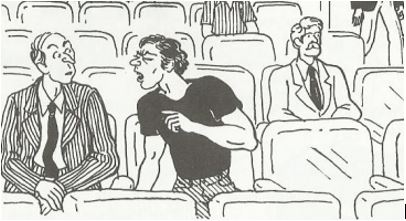
A young man was called up for army service, but he didn't want to become a soldier. When he went for his medical exam, he pretended that his eyesight was very bad.
The doctor pointed to the eye chart on the wall and said, "Please read the top line."
"The top line of what?" the young man asked. "The top line of the chart," the doctor replied. "What chart?" the man asked. "The one on the wall," the doctor said. "What wall?" the man asked.
Finally, the doctor decided that the man's eyes were not good enough for army service.
That evening the same young man was at a movie when another man came in and sat next to him in the dark. When the lights went on, the young man saw that his neighbor was the doctor who had examined him earlier. Immediately he said, "Excuse me, ma'am, but does this bus go to Main Street?"
A Answer these questions:
- What did the young man do to avoid military service?
- What did he say when the doctor said, "Please read the top line of the chart"?
- What did the doctor decide at last?
- Where did the young man go that evening?
- Who sat down next to him?
- What did the young man say when the lights went on?
B Which of these sentences are true? Write down the correct ones.
- The young man in this story was unwilling to do his military service.
- The young man in this story was willing to do his military service,
- He avoided it by pretending that he had bad eyesight.
- He failed to get in because his eyesight was very bad.
- When the doctor gave him orders, he could not understand what the doctor said.
- When the doctor told him to look at things, he pretended he could not see them.
- He went into a movie theater by mistake, thinking it was a bus.
- He went into a movie theater to see a film.
- The doctor came into the theater with the young man.
- The doctor came into the theater after the young man.
C Write the number of the correct sentence under each picture:

1-He asked him whether the bus he was o went to Main Street.
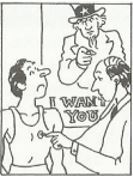
2-He went to the doctor for a medical exam.
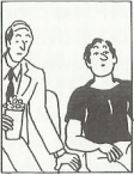
3-Someone came in and sat down next to him in the dark.
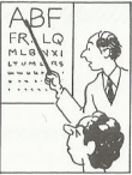
4-The doctor tested his eyes.

5-Then he let the young man go.
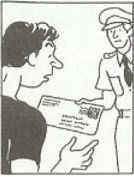
6-A young man got a letter from the army.
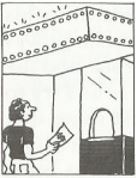
7-The young man went to a movie that evening.
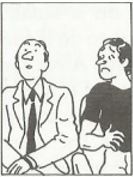
8-When the lights came on, the young man saw that it was the doctor.
 الاكثر قراءة في Advanced
الاكثر قراءة في Advanced
 اخر الاخبار
اخر الاخبار
اخبار العتبة العباسية المقدسة

الآخبار الصحية















 قسم الشؤون الفكرية يصدر كتاباً يوثق تاريخ السدانة في العتبة العباسية المقدسة
قسم الشؤون الفكرية يصدر كتاباً يوثق تاريخ السدانة في العتبة العباسية المقدسة "المهمة".. إصدار قصصي يوثّق القصص الفائزة في مسابقة فتوى الدفاع المقدسة للقصة القصيرة
"المهمة".. إصدار قصصي يوثّق القصص الفائزة في مسابقة فتوى الدفاع المقدسة للقصة القصيرة (نوافذ).. إصدار أدبي يوثق القصص الفائزة في مسابقة الإمام العسكري (عليه السلام)
(نوافذ).. إصدار أدبي يوثق القصص الفائزة في مسابقة الإمام العسكري (عليه السلام)


















